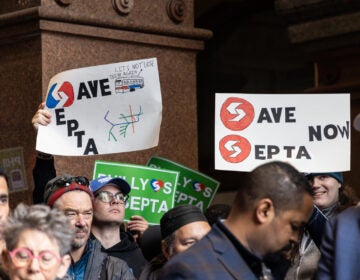Philly police may reconsider policy on seizing small sums of cash from suspects
Listen
(Andy Dean Photography/Bigstock.com)
Nearly a year after a report found that Philadelphia authorities seize $1 million annually from innocent residents using a controversial state law, Police Commissioner Richard Ross recently told City Council that he’d consider reviewing the department’s policy on small-cash civil forfeitures.
That followed Councilwoman Helen Gym grilling the city’s top cop about the practice during the department’s budget hearing on Wednesday.
“Would you consider committing to a review, or even a practice of only seizing cash from stops when there is an arrest and conviction,” Gym asked Ross.
“Would we be open to that?” Ross said, referring to the prospect of evaluating the practice. “Sure.”
Ross quickly noted that “a lot of times, people do studies and drop it in the police department’s lap, and we aren’t left with resources to get it done.”
During the same hearing, Ross said that his department is facing a severe staffing shortage.
Most cash-seizure targets, Ross said, are suspected drug dealers or those involved in the narcotics trade in some capacity. Federal authorities, not city police, often undertake those investigations.
But on the city level, Ross said, department policy recently changed to require all seized cash to be immediately reported, instead of sitting in evidence lockers for months.
Molly Tack-Hooper of the American Civil Liberties Union said many states have civil forfeiture laws, but Philadelphia has been in the spotlight for how aggressively police and prosecutors use the law.
Seized money, she said, can be distributed to local authorities as bonuses.
“Which absolutely creates an incentive to pursue this aggressively and to pursue forfeitures that won’t be challenged,” she said.
The ACLU found in a June report that for sums under $200, only 3 percent of people showed up to court to contest the seizure.
“It’s certainty an uphill battle, especially because there’s no right to counsel in these proceedings,” Tack-Hooper said. “So it doesn’t make rational economic sense to try to hire a lawyer, or take the time off work that would be necessary to go to court on their own and fight a forfeiture of, you know, $100.”
The report also found that 32 percent of cash forfeitures in Philadelphia were from individuals who were not convicted of any crimes.
Activists are hoping that Pennsylvania will pass a law that mirrors one in New Mexico, where cash can only be seized after a criminal conviction.
District Attorney Seth Williams has stood by prosecutors’ use of the laws as a way to cut off drug dealers’ profits. He has said that his office takes money and property away form drug dealers, not random people.
The Institute for Justice filed a federal class-action lawsuit in 2014 representing Philadelphia area property owners challenging the state’s forfeiture laws. Prosecutors have agreed to limit how often they seize homes before a defendant’s appears before a judge.
Both the institute and the defendants, including the District Attorney’s Office and the City of Philadelphia, have until June to finish collecting evidence in the case before a yet-to-be determined trial date, since several other issues in the suit remain unresolved.
WHYY is your source for fact-based, in-depth journalism and information. As a nonprofit organization, we rely on financial support from readers like you. Please give today.




